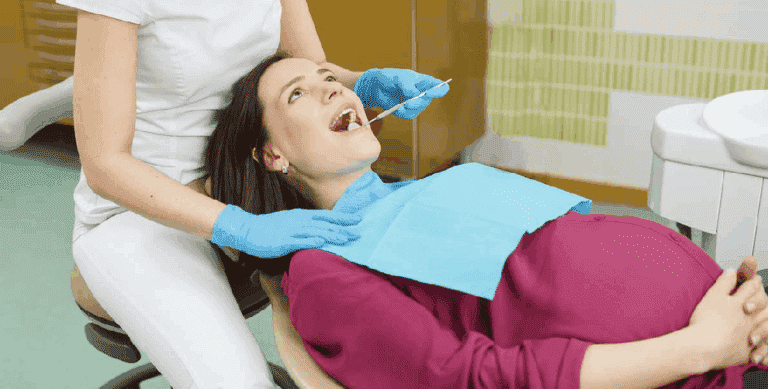BEFORE YOU PLAN YOUR PREGNANCY
You should try to make an appointment with your dentist before planning your pregnancy. The dentist will then check the condition of your teeth and examine the gum tissue. Preventive procedures like scaling and polishing ie cleaning of teeth can be carried out and any oral health conditions can be treated in advance of your pregnancy.
DURING YOUR PREGNANCY
It is extremely important to inform your dentist that you are pregnant. Informing the dentist about the month of pregnancy also is necessary to decide whether the dental treatment can be proceeded with.
When to be treated?
As a precautionary measure, dental treatments during the first trimester and second half of the third trimester should be avoided as much as possible. These are critical times in the baby’s growth and development and it’s simply wise to avoid exposing the mother to procedures that could in any way influence the baby’s growth and development.
However, routine dental care can be received during the second trimester. All elective dental procedures should be postponed until after the delivery.
Medication that is safe to be taken
Please inform your dentist of all medication and prenatal vitamins that your doctor has asked you to take along with the dosages. This is very important for the dentist to decide your line of treatment.
A drug like a tetracycline should be avoided because it causes harm to the development of your child’s teeth. Every medicine is taken during pregnancy whether for toothache or any other treatment should only be taken with the consent of the gynecologist.
Dental X rays during pregnancy

X-rays must be avoided during pregnancy. However, during dental emergencies, your dentist must take extreme measures to safeguard you and your baby. Lead aprons and thyroid collars should be provided. Advances in dental technology have made X-rays much safer today.
Some things to remember
- Don’t skip your regular dental appointment now more than ever.
- Regular periodontal (gum) exams are very important because hormonal changes put you at an increased risk for periodontal problems and bleeding gums which is a condition called gingivitis.
- Tartar (calculus) accumulation in the lower front teeth and upper back teeth during this time is very commonly seen.
- Pay particular attention to any changes in your gums during pregnancy. If tenderness, bleeding or gum swelling occurs at any time during your pregnancy, talk with your dentist or periodontist as soon as possible.
- Follow your oral hygiene processes during pregnancy to avoid any further complications.
Coping with morning sickness
If morning sickness is preventing you from brushing your teeth ask your dentist to prescribe a bland-tasting toothpaste. Rinse your mouth with water or mouthwashes if there are frequent bouts of vomiting.
Diet for healthy teeth – you and the baby
Sweet and sour cravings are very common during pregnancy. However, avoid these as they can lead to oral problems. Also the more frequently you snack, the more the chances of tooth decay. Studies have shown that bacteria responsible for tooth decay are transmitted from the mother to the baby.
The baby’s tooth is formed during the third month of pregnancy. Hence eat healthy during pregnancy. Foods like cheese, milk and yogurt have many essential vitamins and minerals which are necessary for the growth and development of the child’s teeth.
AFTER YOUR PREGNANCY
If you experienced any gum problems during your pregnancy, see your dentist soon after delivery to have your entire mouth examined and periodontal health evaluated.





